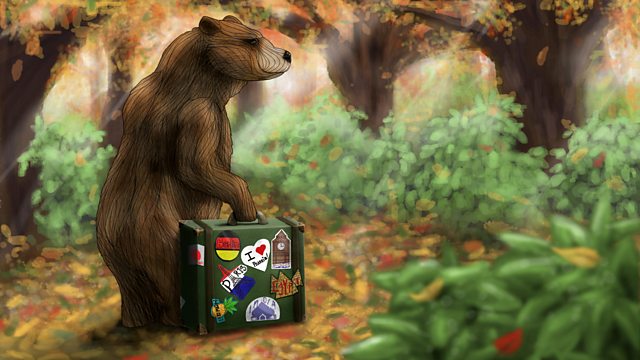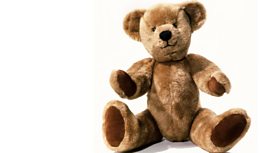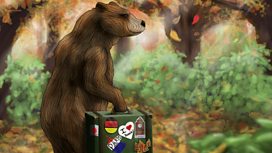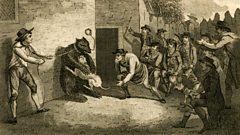Bears
Brett Westwood explores how bears have influenced art, literature and belief. Who doesn't love teddy bears? But their similarity to us has been both an advantage and a downfall.
Bears (of the family Ursidae) and people go back a long way. They are disconcertingly human-like, captured in the most popular of tales - Goldilocks, Snow White and Rose Red and Winnie the Pooh. Many cultures from northern Europe to North America and China have traditionally worshipped bears, regarding them as the spirit of ancestors. In the Palaeolithic era bear bones were carefully buried in unnatural poses and their skulls in a circle. Christian saints have tamed bears as a sign of holiness, though bears were persecuted to deter pagan cults. In medieval times the cruel and gruesome sport of bear-baiting was a common pastime, enjoyed by royalty and peasants alike. Seeing a bear tormented by dogs may have been entertainment, but it was also a physical representation of suffering and struggle at a time when bears were still part of a greater mythology. The mystical qualities of bears is reflected in our seeing them in the stars, as the Great and Little Bear track their way across the heavens. The constancy of the Great Bear constellation was used by slaves in the American Civil War to guide them to safety, away from conflict; their song "Follow the Drinking Gourd" tells how to follow the lights of the constellation – the gourd being code for The Great Bear. Today the white polar bear is a potent symbol of climate change: reliant on ice-covered land, it is in danger of losing its habitat. As we become more removed from nature, the style of the much-loved teddy bear has changed. Originally they looked like real bears, today they are pink and fluffy and short-limbed. Our relationship with bears has always been complex and still is today.
Originally broadcast in a longer form on 8th September 2015
Original Producer : Mary Colwell
Archive Producer : Andrew Dawes
Last on
![]()
Our relationship with bears has evolved but remains strong. What’s the appeal of bears?
![]()
The World According to Bear
Do bears defect in the woods? David Schneider plays a bear with Communist sympathies.
![]()
Who Killed the Bears?
Steve Punt investigates the 1889 killing of two performing bears in the Forest of Dean.
Clips
-
![]()
The World According to Bear
Duration: 01:38
-
![]()
Why was bear-baiting popular?
Duration: 02:36
-
![]()
How the teddy bear got its name
Duration: 01:36
Professor Adrian Lister

He is the author of more than 150 scientific papers and four books, Evolution on Planet Earth, Mammoths: Giants of the Ice Age, Mammoths: Ice Age Giants and a children’s book, Tracker’s Guide to Ice Age Animals. Prior to joining the Museum, he was Professor of Palaeontology at UCL. He completed his PhD at Cambridge on evolution of fossil mammals.
Richard Sabin

He is special advisor to the NHM’s , carries out endangered species identification work for UK and international law enforcement, and develops internationally recognised protocols and techniques for the extraction of genetic material from the Museum's research specimens.
Bernd Brunner

He is the acclaimed author of , , , and .
Catherine Howell

She has played a key role in many of the Museum’s major exhibitions including Alice: The Wonderland of Lewis Carroll (1998). She was the curator of the hugely successful touring exhibitions Teddy Bear Story: 100 years of the teddy bear (2002) and Magic Worlds (2011).
Catherine Howell has worked at the Museum of Childhood since 1991 and is the collections specialist on the history of childhood toys and games.
Professor Erica Fudge

Her work has also appeared in magazine and she is the director of the .
Professor Paul Pettitt

He has also co-directed excavations in the world famous site of with Mark White, with whom he also wrote The British Palaeolithic.
Lee Pullen

He is currently works in the planetarium in where he heads a team that produces content for over 100,000 visitors a year.
Professor Kimberley Reynolds

She has served on the board of a number of national bodies and has been a trustee of , the National Centre for Children's Books, since it opened in 2004. She has published widely across the history of children's literature including for Oxford University Press.
With the help of a Major Leverhulme Fellowship she recently completed a book called Left Out: the forgotten radical tradition of publishing for children in Britain, 1910-1949. This will be published by Oxford University Press in spring 2016.
Broadcasts
- Tue 8 Sep 2015 11:00����ý Radio 4
- Mon 14 Sep 2015 21:00����ý Radio 4
- Sun 18 Jun 2023 06:35����ý Radio 4








